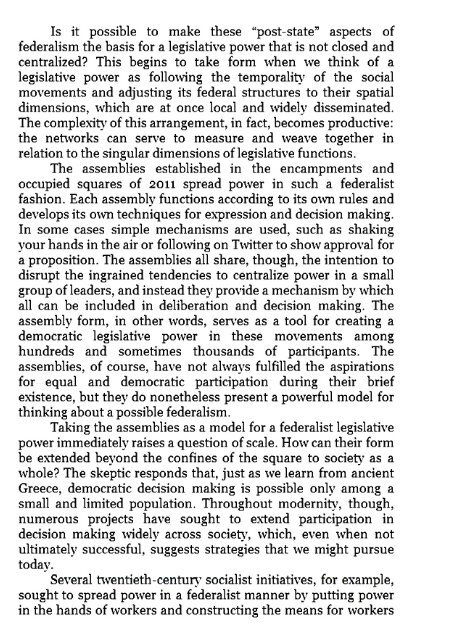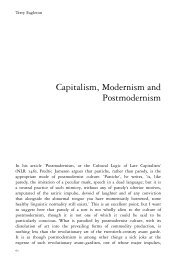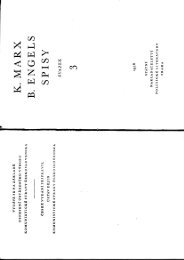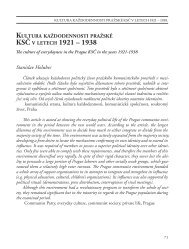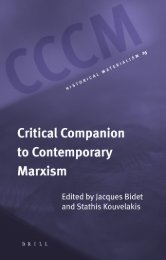Chapter 1: Subjective Figures of the Crisis ... - Negri in English
Chapter 1: Subjective Figures of the Crisis ... - Negri in English
Chapter 1: Subjective Figures of the Crisis ... - Negri in English
Create successful ePaper yourself
Turn your PDF publications into a flip-book with our unique Google optimized e-Paper software.
Is it possible to make <strong>the</strong>se "post-state" aspects <strong>of</strong><br />
federalism <strong>the</strong> basis for a legislative power that is not closed and<br />
centralized This beg<strong>in</strong>s to take form when we th<strong>in</strong>k <strong>of</strong> a<br />
legislative power as follow<strong>in</strong>g <strong>the</strong> temporality <strong>of</strong> <strong>the</strong> social<br />
movements and adjust<strong>in</strong>g its federal structures to <strong>the</strong>ir spatial<br />
dimensions, which are at once local and widely dissem<strong>in</strong>ated.<br />
The complexity <strong>of</strong> this arrangement, <strong>in</strong> fact, becomes productive:<br />
<strong>the</strong> networks can serve to measure and weave toge<strong>the</strong>r <strong>in</strong><br />
relation to <strong>the</strong> s<strong>in</strong>gular dimensions <strong>of</strong> legislative functions.<br />
The assemblies established <strong>in</strong> <strong>the</strong> encampments and<br />
occupied squares <strong>of</strong> 2011 spread power <strong>in</strong> such a federalist<br />
fashion. Each assembly functions accord<strong>in</strong>g to its own rules and<br />
develops its own techniques for expression and decision mak<strong>in</strong>g.<br />
In some cases simple mechanisms are used, such as shak<strong>in</strong>g<br />
your hands <strong>in</strong> <strong>the</strong> air or follow<strong>in</strong>g on Twitter to show approval for<br />
a proposition. The assemblies all share, though, <strong>the</strong> <strong>in</strong>tention to<br />
disrupt <strong>the</strong> <strong>in</strong>gra<strong>in</strong>ed tendencies to centralize power <strong>in</strong> a small<br />
group <strong>of</strong> leaders, and <strong>in</strong>stead <strong>the</strong>y provide a mechanism by which<br />
all can be <strong>in</strong>cluded <strong>in</strong> deliberation and decision mak<strong>in</strong>g. The<br />
assembly form, <strong>in</strong> o<strong>the</strong>r words, serves as a tool for creat<strong>in</strong>g a<br />
democratic legislative power <strong>in</strong> <strong>the</strong>se movements among<br />
hundreds and sometimes thousands <strong>of</strong> participants. The<br />
assemblies, <strong>of</strong> course, have not always fulfilled <strong>the</strong> aspirations<br />
for equal and democratic participation dur<strong>in</strong>g <strong>the</strong>ir brief<br />
existence, but <strong>the</strong>y do none<strong>the</strong>less present a powerful model for<br />
th<strong>in</strong>k<strong>in</strong>g about a possible federalism.<br />
Tak<strong>in</strong>g <strong>the</strong> assemblies as a model for a federalist legislative<br />
power immediately raises a question <strong>of</strong> scale. How can <strong>the</strong>ir form<br />
be extended beyond <strong>the</strong> conf<strong>in</strong>es <strong>of</strong> <strong>the</strong> square to society as a<br />
whole The skeptic responds that, just as we learn from ancient<br />
Greece, democratic decision mak<strong>in</strong>g is possible only among a<br />
small and limited population. Throughout modernity, though,<br />
numerous projects have sought to extend participation <strong>in</strong><br />
decision mak<strong>in</strong>g widely across society, which, even when not<br />
ultimately successful, suggests strategies that we might pursue<br />
today.<br />
Several twentieth-century' socialist <strong>in</strong>itiatives, for example,<br />
sought to spread power <strong>in</strong> a federalist manner by putt<strong>in</strong>g power<br />
<strong>in</strong> <strong>the</strong> hands <strong>of</strong> workers and construct<strong>in</strong>g <strong>the</strong> means for workers


